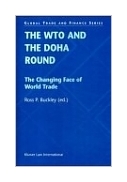|
||
podział tematyczny • wydawnictwa anglojęzyczne podział tematyczny Newsletter: • Zamów informacje o nowościach z wybranego tematu Informacje: • sposoby płatności i dostawy • kontakt • Cookies na stronie • Regulamin zakupów Napisz propresssp@gmail.com |
THE WTO AND THE DOHA ROUNDBUCKLEY R.wydawnictwo: KLUWER , rok wydania 2003, wydanie Icena netto: The appointment of Dr. Supachai Panitchpakdi as Director-General of the World Trade Organization in 2002 reflects the changing power realities within the WTO. Coupled to this is the growing sense among developing countries that they have been cheated in the way the Uruguay Round commitments have been implemented and a return to unilateralism by the U.S.. The world trading system thus stands at a crossroads. The success of the current Doha Round of trade negotiations hangs in the balance. This volume examines various ways in which the WTO might be reformed or improved and the chances of success in the Doha Round thus enhanced. The WTO has an important role to play in managing globalisation so that its benefits are shared far more equally among individuals than is today the case. This challenge must be met if we are not to slide backwards into a less interdependent, and far poorer, world. Among the specific issues researched and analysed here are: the U.S.-led return to a unilateralist and interventionist approach to global problems; the importance of the rules-based WTO system to developing nations as a crucial alternative to power politics; the failure to achieve enhanced access to developed world markets for agricultural products, textiles, clothing, and footwear; the relevance of GATS and TRIPS to the developing world; internal WTO governance issues, including the important role of the Secretariat as negotiator and mediator; the implementation phase of the dispute settlement understanding; the continuing resistance to linking trade and environment; the place of human rights in the international trading system; and the likely impact of the double scourge of AIDS and terrorism on flows of trade, capital, people, and knowledge. It will quickly be observed that this book represents an approach to world trade theory that will not be welcome in all circles. Yet few will deny its enormous value as a reality check. No concerned policy maker, official or academic can afford to ignore it. Table of Contents 1. The Changing Face of World Trade and the Biggest Issue Facing the WTO, and the World, Today; R. P. Buckley. 2. Living Up to the Promises of Global Trade; C. Sampford, T. Chataway, R. Lui, M. Palmer. 3. The Multilateral Trading System at Risk? Three Challenges to the World Trade Organisation; A. Capling. 4. The Post-Doha Trade Agenda: Questions About Constituents, Competence and Coherence; J. L. Dunoff. 5. International Civil Servants and Multilateral Trade Negotiations; Xu Yi-chong, P. Weller. 6. The Implementation Phase of Dispute Settlement in the World Trade Organization: An Imperfect System Needing Reform to Maintain its Effectiveness and Credibility; B. Mercurio. 7. It s Not Easy Being Green Trade and Environment Linkages Beyond Doha; J. McDonald. 8. Dreaming of Red Mansions: Rights, China and the WTO; A. Francis. 9. Towards Post-establishment National Treatment of Foreign Investment Enterprises in China From BITs to TRIMs; Chen Xuebin. 10. Cultural and Political Contexts for the Future of World Trade; R. Dellios. 11. Lessons for the WTO from the Bilateral Free Trade Agreements of EFTA; A. Ziegler. 12. The Twin Security Challenges of AIDS and Terrorism: Implications for Flows of Trade, Capital, People and Knowledge; B. Condon. 320 pages
Księgarnia nie działa. Nie odpowiadamy na pytania i nie realizujemy zamówien. Do odwolania !. |


